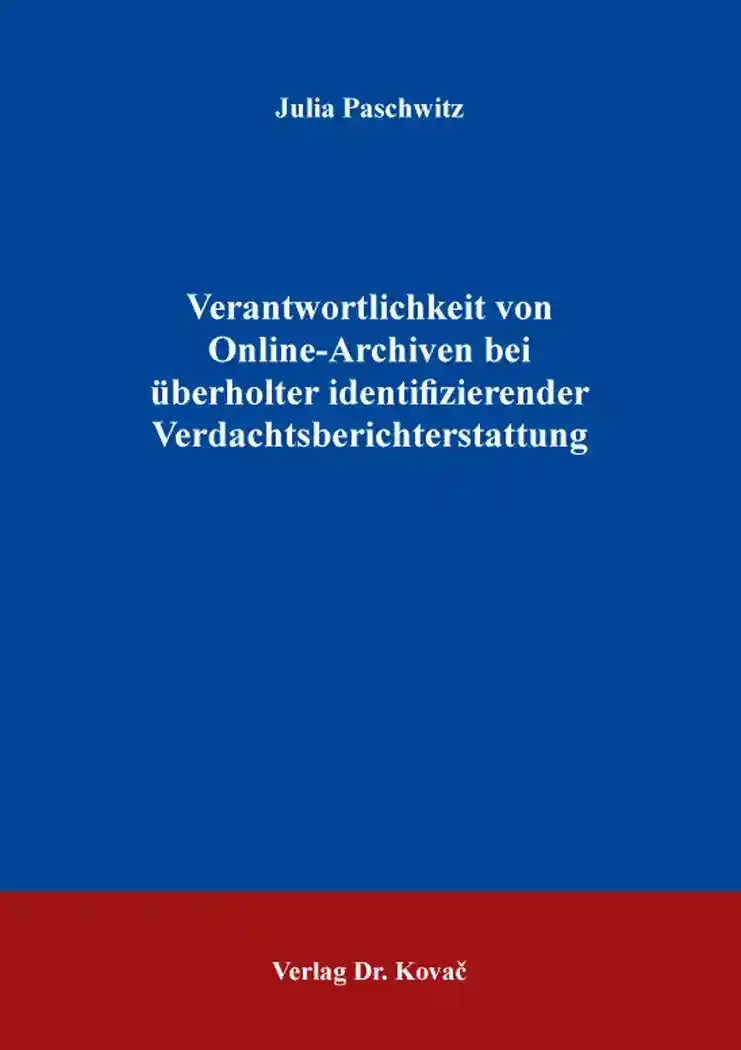Julia PaschwitzVerantwortlichkeit von Online-Archiven bei überholter identifizierender Verdachtsberichterstattung
Schriften zum Medienrecht, volume 52
Hamburg 2021, 328 pages
ISBN 978-3-339-12630-6 (print) |ISBN 978-3-339-12631-3 (eBook)
Rezension
[...] Der an dem relevanten, brandaktuellen und komplexen Thema des deutschen Medienrechts interessierte Leser wird durch die vorgestellte instruktive Forschungslandschaft und durch detaillierte Deskription und Würdigung der deutschen und europäischen Judikatur bereichert. [...]
About this book deutschenglish
In today’s world, reporting on suspicions and allegations with regards to criminal offences can be found in the media almost every day. The reason for this is a great interest in alleged criminal offences among the public. In principle, the media have the right to report on suspicions and allegations of criminal offences, provided the reporting is compliant with German law. This is because such (identifying) reporting of suspicions and allegations is only legal if certain conditions are met. But what happens if the suspicions or allegations reported on are not confirmed? What happens if the public prosecutor closes the previously initiated investigation pursuant to section 170 (2) of the German Code of Criminal Procedure, because there is no sufficient evidence? The reporting of suspicions and allegations can still be found in its original version afterwards, because it is still kept available for retrieval in online archives of media companies, but it no longer reflects the current factual situation. However, such initially lawful reporting of suspicions and allegations does not become unlawful due to the closing of the investigation pursuant to section 170 (2) of the German Code of Criminal Procedure. In fact, the reporting is outdated. The public availability of such an outdated reporting of suspicions and allegations can also have considerable consequences for the person concerned, which again are intensified by the fact that it can be found via search engines. The stigmatisation and prejudgement effects can be of a personal, social and economic nature. It is almost hopeless for the previous suspected person to be forgotten and not to be associated with the suspicions and allegations.
In light of this, it is questionable how the conflicting interests in the context of providing outdated identifying reporting on suspicions and allegations can be brought into an appropriate balance. Consideration could be given to extending the responsibility of online archive operators by imposing organisational obligations. It will therefore be examined whether the obligations from section 3 of the Act to Improve Enforcement of the Law in Social Networks (Network Enforcement Act), Article 28b of the Audiovisual Media Services Directive (AVMSD) as well as Article 25 of the General Data Protection Regulation (GDPR) and the requirements for a counterstatement can be transferred to the online archive operators.
Keywords
ErmittlungsverfahrenMedienrechtOnline-ArchivePersönlichkeitsrechtPrangerwirkungPresseRecht auf VergessenwerdenRechtswissenschaftSuchmaschinenÜberholungVerdachtsberichterstattungVorverurteilungIhr Werk im Verlag Dr. Kovač

Möchten Sie Ihre wissenschaftliche Arbeit publizieren? Erfahren Sie mehr über unsere günstigen Konditionen und unseren Service für Autorinnen und Autoren.
